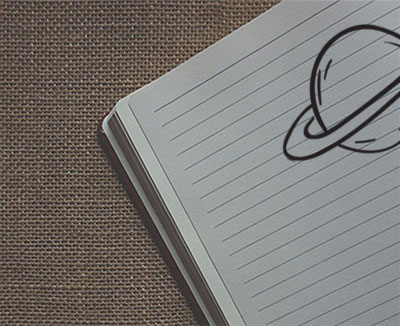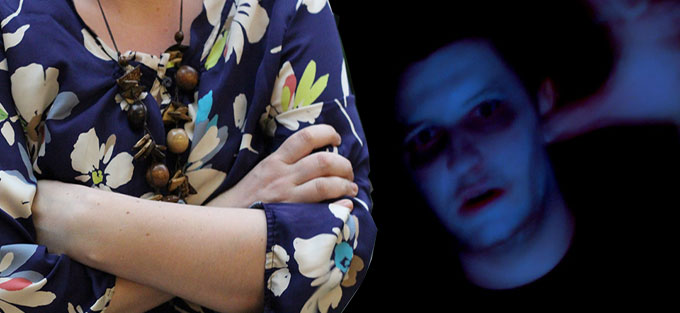by Sarah Carson
I’ve never forgotten the night I realized my boyfriend, Jordan, and I were over. I’d just returned home from another of the hours-long arguments we’d been having for months. It was the middle of the night. I plopped myself down on the couch in exhaustion and surveyed the damage the relationship was doing to my life. My apartment was a mess. My poor dog was desperate for a walk. A stack of student papers from the night class I was teaching had been waiting to be graded for weeks.
That night I admitted for the first time that I’d put my entire life on hold to try to save a relationship I knew had already outlived its usefulness. So I did the one thing that’s always helped me through moments like this: I wrote a poem.
| The New Planet After You Things sure have been different on the new planet since you left. We try to get things going: pick-up games of softball or coffee and donuts before school, but you’re all people talk about. Every conversation inevitably just leads to someone going on and on about what a good dancer you were, how you always made us laugh parties, how much you look like James Dean. Every now and then someone thinks they hear your name bouncing off a satellite and we all go running, but it’s usually nothing. We’ve lost entire afternoons to discussing how much we wish you’d come back. We understand why you wouldn’t, but it doesn’t keep every passing comet from sounding like you coming in for a landing. It’s no way to live, really, but it’s what we’ve got. |
||
How poetry gets us through
 The poem was just one of many poems I wrote throughout that relationship. When times were good, I wrote love poems. When times were bad, I wrote laments. I started writing poems where Jordan became an alien. Then a zombie. Then a ghost. I put them in a book called Poems In Which You Die. My friends thought they were hilarious. Jordan thought I’d lost my mind.
The poem was just one of many poems I wrote throughout that relationship. When times were good, I wrote love poems. When times were bad, I wrote laments. I started writing poems where Jordan became an alien. Then a zombie. Then a ghost. I put them in a book called Poems In Which You Die. My friends thought they were hilarious. Jordan thought I’d lost my mind.
Of course, I didn’t invent this practice of writing poetry to get through the tough times. You may have heard of a little book called the Bible which is filled with poems of heartbreak, loss and confusion, with lines like:
I am poured out like water,
and all my bones are out of joint;
my heart is like wax;
it is melted within my breast;
my mouth is dried up like a potsherd,
and my tongue sticks to my jaws;
you lay me in the dust of death. (Psalm 22:14-15)
I believe this tradition has persisted because, let’s face it, we need something to help us get through. Humans are not good at talking about hard things. And break ups are particularly difficult to discuss because with so many other terrible things in the world – death, disease, war, injustice – a break up doesn’t seem like it should be a big deal.
But break ups are a big deal. Losing a person you love is a big deal. But when Jordan and I were breaking up (which, by the way, was not that night on the couch; it was two years later – so if you’re having trouble breaking it off with someone who’s clearly not good for you, I understand), my friends didn’t know what to say to me.
When I talked about how hard it was to let go, to give up, I couldn’t help but feel like a buzzkill, like everyone wanted to be talking about something else. My poems became a way to communicate. They opened a door to a larger conversation where I could sit with another person and say, “Isn’t losing someone the worst?”
So if you’re going through a break up (or your friend is going through a break up or you know that you should be going through a break up but haven’t found it in yourself to break it off yet) here are three things you should know:
 1. You don’t have to just get over it. Falling in love with and then losing someone–whether it’s a boyfriend or a girlfriend or a friend or a family member or a pet – is painful. We all react to pain in different ways: with tears, with anger, with grief, with bitterness, with hope. You’re allowed to feel however you feel. It’s all a part of being human. Jesus cried. Jesus raged. No one told him to suck it up, and you don’t have to either.
1. You don’t have to just get over it. Falling in love with and then losing someone–whether it’s a boyfriend or a girlfriend or a friend or a family member or a pet – is painful. We all react to pain in different ways: with tears, with anger, with grief, with bitterness, with hope. You’re allowed to feel however you feel. It’s all a part of being human. Jesus cried. Jesus raged. No one told him to suck it up, and you don’t have to either.
2. You don’t have to regret anything. You don’t have to feel sorry that you met someone, had a blast and hoped it would last forever. Recently a friend asked me, “Knowing what you know now, would you do it again?” I felt like the answer she wanted was, “No. Never. I’d never do it again.” But of course I’d do it again! If I was that still that person, in that very moment, of course I’d still go on that first date and the next one and the next one. You don’t regret the good times just because it ended in pain. Didn’t you read The Fault in Our Stars? This is life. It hurts sometimes. It’ll be fine.
3. You will also be fine. Believe me. I know that sometimes it doesn’t feel like you’ll be fine. There were times I thought I couldn’t live without Jordan. I thought he was the one for me, and without him I’d surely be alone forever. And no matter how many people told me I’d be fine, I was sure that nothing would ever make me whole again. But here I am, talking to you from the other side, reminding you that Christians believe in this thing called death and resurrection–that in every death there is new life, that in every ending, something new begins.
So be sad. Be angry. Call in sick and crawl under a blanket. Eat some ice cream (I recommend Ben and Jerry’s with the caramel core). You will get through this. You will be OK again. And if you need something to get you through in the meantime, I highly recommend writing a poem.
Discussion questions:
1. What practices do you have to help yourself through tough times?
2. In what ways have you felt God’s love in times of heartbreak?
3. How might you show love to someone who is experiencing loss—even if might not know the right words to say?
Closing prayer:
Almighty God, we know that you never leave us, that our hurts are your hurts and that it is only in you that we can be made new. Thank you for loving us when others’ love fails us. Help us remember others to whom love has brought loss, those who are lonely and those who long to be made whole.
Sarah Carson is the associate editor of Gather magazine.
Photos by Morguefile.com and Elizabeth McBride. Used with permission.

